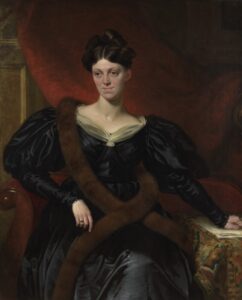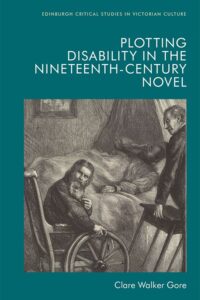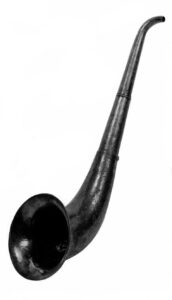Today on the blog, we welcome our colleague Clare Walker Gore, who has recently joined us as a Lecturer in Victorian Literature. Clare offers us a glimpse into her research interests by sharing insights into the multiple ways nineteenth-century writer Harriet Martineau represented her experience of disability.
I first came across Harriet Martineau’s ‘Letter to the Deaf’ (1834) when I was writing my book on representations of disability in nineteenth-century fiction. I had been drawn to Martineau as an example of a writer who was herself disabled, having lost most of her hearing in childhood, but whose life signally failed to conform to the expectations established by fiction of the period for disabled characters.
By 1834, when she published this article on her experience of deafness, Martineau was well known as a writer unafraid to tackle controversial and even ostentatiously ‘unfeminine’ subjects. In 1832 she had made her name, and indeed her fortune, by publishing a spectacularly successful series of pamphlets, Illustrations of Political Economy, and become a notable – in some circles infamous – champion of free market capitalism.
She went on to tackle a wide range of inflammatory subjects, apparently undeterred by attacks on her character in the press and even by ostracism from her own family.
Martineau was clearly a woman who thrived on conflict. As she admitted in her Autobiography (1877), she found hostile reviews more inspiring than positive ones, declaring that ‘the more brutal, the more animating’ they were (Martineau, Autobiography II, 158)

Harriet Martineau
by Richard Evans
oil on canvas, exhibited 1834
NPG 1085
© National Portrait Gallery, London
So it came as something of a surprise to me to find that in her ‘Letter to the Deaf’, Martineau advises her Deaf readers that they must ‘submit to be usually insignificant’, and accommodate themselves to hearing society in every possible way, recommending positively masochistic strategies of self-suppression (Martineau, ‘Letter’, 176). She promises that Deaf readers who mask their true feelings and adopt the rule of turning ‘every sigh into a smile’ will experience the ‘thrill of delight which arises during the ready agreement to profit by pain’ (Martineau, ‘Letter’, 177).
How could so self-assertive and combative a writer have integrated such a view of her own disability with the narrative of her own life?
An answer is offered, I think, by the way Martineau develops her apparently depressing advice as the ‘Letter’ goes on. She exploits one of the commonest tropes of disability in contemporary fiction to offer her Deaf readers a potentially powerful self-image.
Most nineteenth-century novels depict disabled characters as either exceptionally flawed or exceptionally virtuous. Martineau taps into this tradition, suggesting that her Deaf readers will emerge from their ‘trial’ as either ‘selfish in principle, sour in temper, and disagreeable in manners’ or ‘with principles strengthened, affections expanded … and manners graced by the permanent cheerfulness of a settled mind and a heart at ease’ (Martineau, ‘Letter’, 179).
The exceptionally virtuous deaf subject will achieve such perfect self-control, in Martineau’s account, that they will be able to withstand anything in the future: ‘If you have brought vigour out of this conflict … your cheerfulness will probably be beyond the reach of circumstance’ (Martineau, ‘Letter’, 179). In other words, Deafness necessarily entails conflict and possibly produces heroism; it also puts the Deaf subject beyond the comprehension or judgement of their hearing counterparts. ‘No one can judge for you’, she assures her Deaf readers (Martineau, ‘Letter’, 177).
It is this understanding of her disability which shapes Martineau’s self-representation in her Autobiography. She depicts the onset of her deafness as ‘about the best thing that ever happened to me’ (Martineau, Autobiography I, 78). In her account, the struggle it entailed formed her character and freed her from dependence upon her family, in both an intellectual and an emotional sense. In Martineau’s telling, deafness essentially made her the heroine of her own story, the self-reliant and resourceful woman who could reject the belief systems she had inherited, and the limitations imposed by her society.
Indeed, Martineau suggests that disability put her beyond the scope of conventional femininity and allowed her to draw on masculine forms of heroism – acting, as she told her mother in one letter of 1833, the part of ‘a professional son’ rather than a daughter (Martineau, Autobiography III, 91).
Martineau’s choice to live by herself, when she could have lived with members of her family, shocked some reviewers. The novelist Margaret Oliphant, for example, clearly found Martineau’s preference for ‘bachelor life’ deeply unfeminine, suggesting that the Autobiography proved her to be ‘a very clever writer’ who was ‘not much of a woman at all’ (Oliphant, 52; 59).
Martineau anticipates and attempts to disarm such a reaction by insisting that her deafness effectively excepted her from ordinary rules, just as it excluded her from conventional femininity.
Interestingly, however, Martineau occasionally uses her disability not to circumvent but to re-affirm her femininity, in the face of accusations that her writing has in some sense unsexed her. She was criticised, for instance, for championing Thomas Robert Malthus’ highly controversial Essay on the Principle of Population (1798), in which he argued that over-population would lead to disaster unless drastic action were taken – often interpreted as an argument for the use of birth control. In an essay for the conservative Quarterly Review, John Lockhart accused her of having ‘no modest misgivings’ as she promoted ‘unfeminine and mischievous doctrines’ (‘Miss Martineau’s Monthly Novels’, 136).
Recalling how she dealt with such criticism, Martineau uses her ear trumpet – a nineteenth-century version of a hearing aid – to defend her impugned modesty:
‘I consider it, as treated by Malthus, a strictly philosophical question. So treating it, I find no difficulty in it; and there can be no difficulty in it for those who approach it with a single mind. To such I address myself. If any others should come whispering to me what I need not listen to, I shall shift my trumpet, and take up my knitting.’ (Martineau, Autobiography I, 202)
In this scene, Martineau’s ear trumpet becomes an instrument of self-assertion, just as her deafness, while cast as ‘affliction’, became a means of writing herself out of one, undesirable role and into an alternative, more heroic one. It’s an intriguing example of the multiple uses to which disability could be put in nineteenth-century texts, and into both the difficulties but also the possibilities opened up by an autobiographer’s dual identity as both ‘woman’ and ‘writer’.
Clare Walker Gore has recently joined the Department of English and Creative Writing as a Lecturer in Victorian Literature. She is the author of Plotting Disability in the Nineteenth Century Novel (Edinburgh University Press, 2019), and is now pursuing a project on women novelists’ life writing in the nineteenth century.
Works Cited
John Lockhart, ‘Miss Martineau’s Monthly Novels’, Quarterly Review, 49.97 (April 1833), 136 – 152
Harriet Martineau, Autobiography (1877), 3 vols, repr. Cambridge University Press, 2010
Harriet Martineau, ‘Letter to the Deaf’, Tait’s Edinburgh Magazine, 1834, 174–79
Margaret Oliphant, ‘Harriet Martineau’, Blackwood’s Edinburgh Magazine, 121 (April 1877), 472-96
Suggested Further Reading
Harriet Martineau, Deerbrook (1838), repr. Virago, 1983
Margaret Oliphant, The Autobiography and Letters of Mrs Margaret Oliphant (1899), repr. Broadview, 2002




Clare I really enjoyed reading this piece. Thank you !
The power of/in choosing silence – and such a wonderfully performative (and funny) way of demonstrating it. It makes you wonder about the progress associated with ever more tiny hearing aids, no?
Do you know Picker’s book Victorian Soundscapes? That might be of interest, though I checked and Martineau isn’t in the index.
Thanks again for a lovely read, Clare.
Sara (Haslam)
Thank you so much for this reading tip, I will follow that up!
I think the politics of visibility around hearing aids is very interesting: as you say, Martineau is able to use hers in a performative way precisely because it’s visible, but it’s often assumed that mobility, hearing or visual aids should be as invisible as possible.
To hear more from Clare Walker Gore on Victoria-era attitudes to disability, listen to her discuss novelist Wilkie Collins on BBC Radio 3’s Free Thinking, where she talks with Tom Shakespeare, Tanvir Bush, and Matthew Sweet about Collins’ physical pain & drug dependency, & his multifaceted representations of disabled characters: https://bbc.in/3W4cwPc
If you fancy another dose of literary wisdom from Clare Walker Gore, check out her essay for BBC Radio 3’s Stories to Keep Space for on the Bookshelves series. She’s certainly convinced us to keep space for Charlotte M Yonge’s The Heir of Redclyffe – a
thrillingly romantic tale of family feuds. https://bbc.in/3Jpegzm